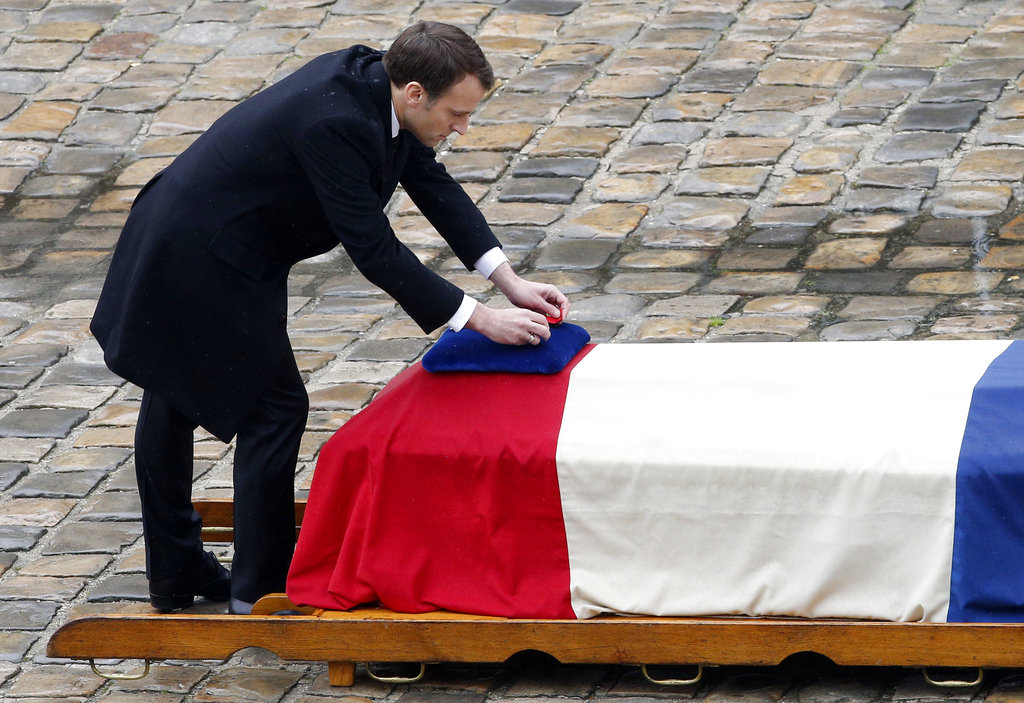Did slip-ups help French attacker slip past security net?

French President Emmanuel Macron posthumously awards the Legion of Honor to Lt. Col. Arnaud Beltrame during a ceremony Wednesday March 28, 2018 at the Hotel des Invalides in Paris. The slain hero of last week’s extremist attack in southern France will be posthumously awarded the Legion of Honor by French President Emmanuel Macron during a solemn day-long national homage to him. (AP Photo/Christophe Ena)
PARIS — He did jail time for petty crime and was under French surveillance as a potential extremist, yet Radouane Lakdim slipped through the French security net.
Lakdim — who killed four people in a shooting-and-hostage rampage in southern France last week — is a prime example of the challenges that security officials face and the missteps they can make as homegrown extremists multiply.
Even before France buried his victims Thursday, angry voices asked what went wrong.
The questions are coming from the victims’ families, opposition leaders and even from Morocco’s counterterrorism chief — whose country has helped France investigate dual-national extremists in the past but was never told that the French-Moroccan Lakdim was a risk.
Did an upcoming summons to meet with intelligence officials play a role in Lakdim’s decision to spring into action? Was there a slip-up in surveillance?
Experts say French intelligence services are drowning in data and lacking enough analysts to interpret.
More than 20,000 names are on two lists of radicalized or potentially radicalized people in France. It takes 20 officers to survey a single person daily, experts say.
Lakdim was one of more than 15 people in France who were under surveillance as potentially dangerous and then went on to commit attacks and kill people since 2012. With soldiers in the streets, a new, tougher terrorism law and new efforts to prevent radicalization, France appears to be covering all the bases. But attacks keep coming.
Lakdim took his sister to school on March 23 then went on to kill in the name of the Islamic State group in a three-stage attack in the medieval city of Carcassonne, where he lived, and in the nearby town Trebes. The 25-year-old was shot dead later that day when police stormed a supermarket to free his hostages.
By the time he died, Lakdim had been convicted twice on drug and weapons possession charges; was suspected of belonging to a local Salafist movement; had a radicalized girlfriend who had converted to Islam and is now charged in the case; owned a saber, a handgun and knives; had done a month of prison time and was to go before a court on April 23 for possessing a knife and driving without a permit.
The profile mimics those of many small-time delinquents. But questions arise because Lakdim was on two watch lists, starting in 2014, and had been closely monitored since late 2015, according to anti-terrorism prosecutor Francois Molins. The surveillance failed to provide “warning signs of an intention to act” or indications he planned to travel to Syria or Iraq, Molins said.
Interior Minister Gerard Collomb on Wednesday confirmed reports that French security services were poised to reduce the surveillance on Lakdim. Yet Collomb maintained there were no “dysfunctions” in tracking him.
“This poses once again the question of the efficacy of the surveillance,” said Yves Trotignon, a former intelligence official.
In 2016, one of two men who slashed a priest’s throat during Mass in a small Normandy town wore an electronic bracelet after serving prison time. The man who killed a police couple in their home outside Paris a month earlier was under surveillance. A man who tried to crash his car loaded with gas canisters and weapons into gendarmes on Paris’ Champs-Elysees last year was under surveillance, yet authorized to have a gun permit.
French authorities stress their successes. While 11 deadly attacks have been carried out since the Charlie Hebdo newspaper and a kosher grocery were attacked in January 2015, 51 attacks have been thwarted and 17 more have failed, Prime Minister Edouard Philippe told lawmakers Tuesday.
A 100 percent success rate in counter-terrorism is impossible, and the threat will last for years, authorities warn. Trotignon compares a terror attack to an industrial accident because “there is never a single cause.”
Investigators look for attack triggers.
The newspaper Le Monde reported that Lakdim had recently received a written summons from French intelligence headquarters for an “administrative meeting” — a flag that he was under watch.
At the time of the failed Champs-Elysees ramming attack, Le Monde reported that the driver, Adam Djaziri, had received his third demand for an “administrative meeting” shortly before the attack, which killed no one but himself.
Across the Mediterranean, the chief of Morocco’s counterterrorism agency questioned why France doesn’t take more aggressive steps against suspected radicals.
Abdelhak Khiame told The Associated Press that as of Tuesday — four days after Lakdim’s deadly attack — he had heard nothing from Paris, despite a policy of information sharing.
“His country of birth should have been notified that its national is wanted by French security,” said Khiame, director of Morocco’s Central Bureau of Judicial Investigations. Moroccans make up a large subset of Islamic State group fighters, and dual Moroccan-European citizens have taken part in past IS attacks in Europe.
Alain Bauer, a leading criminologist, maintains the attacks by Lakdim could have been thwarted. Analysis is the key, he and other experts said, along with on-the-ground tailing.
“Like almost all others that … succeeded, it could have been avoided,” said Bauer, who has written a book on French intelligence. “We rely on ‘Inspector Google’ to decide how to fight YouTube radicals. It doesn’t work … these tools cannot replace human intelligence.”